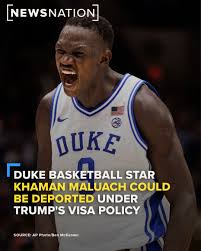Khaman Maluach, a great basketball player for Duke, is one of the South Sudanese who could be deported under the new Trump policy.
Khaman Maluach, a 7-foot-2 center for the Duke Blue Devils, has emerged as one of college basketball’s most promising talents. Born in Rumbek, South Sudan, and raised as a refugee in Uganda, Maluach’s journey to Duke and the NBA has been nothing short of remarkable. However, recent U.S. immigration policy changes have cast a shadow over his future, potentially jeopardizing his academic and athletic pursuits.
Maluach’s introduction to basketball was serendipitous. In 2019, a boda boda motorcyclist noticed his towering stature and encouraged him to attend a basketball camp organized by former NBA player Luol Deng. This encounter ignited Maluach’s passion for the sport. He honed his skills at the NBA Academy Africa in Senegal, a program that combines elite basketball training with education.
His professional career began with Cobra Sport in South Sudan, followed by stints with AS Douanes in Senegal and the City Oilers in Uganda. During the 2024 Basketball Africa League (BAL) season, Maluach led the league in rebounding, showcasing his dominance on the court .
In 2024, Maluach joined the Duke Blue Devils, quickly making an impact as a freshman. Over the course of the season, he averaged 8.6 points, 6.6 rebounds, and 1.3 blocks per game, earning a spot on the ACC All-Freshman Team. His defensive prowess and potential as a future NBA draft pick garnered national attention .
In April 2025, the Trump administration announced the revocation of all U.S. visas held by South Sudanese nationals, citing the country’s refusal to accept repatriated citizens. This policy, effective immediately, rendered existing visas invalid and suspended the issuance of new ones. The decision was made in response to South Sudan’s non-cooperation in repatriating individuals ordered removed from the U.S. .
For Maluach, this policy posed immediate concerns. As a student-athlete, he likely holds a student visa, which could be subject to revocation under the new rules. The uncertainty surrounding his immigration status threatened his ability to continue his education and athletic career in the United States.
Duke University, where Maluach had become a key player, expressed concern over the policy’s implications. University officials, including President Vince Price and Athletic Director Nina King, were reportedly assessing the situation to understand its impact on Maluach and other South Sudanese students. The timing of the policy announcement, coinciding with Duke’s Final Four game, added to the urgency of the matter .
The broader basketball community also took notice. Figures such as former Duke coach Mike Krzyzewski, NBA Commissioner Adam Silver, and former NBA player Luol Deng, a fellow South Sudanese, were mentioned as potential allies in advocating for Maluach’s case. Their support underscored the significance of Maluach’s situation within the sport .
The policy faced criticism from various quarters. U.S. Representatives Deborah Ross and Valerie Foushee, both from North Carolina, urged Secretary of State Marco Rubio to reconsider the decision. They highlighted the adverse effects on individuals like Maluach, who are contributing positively to American society. Their letter emphasized that the blanket visa revocation unfairly targeted law-abiding citizens and students .
Legal experts and advocacy groups also expressed concern over the policy’s potential to disrupt the lives of South Sudanese nationals in the U.S., particularly those who had fled conflict and sought refuge. The policy’s broad application raised questions about its fairness and effectiveness in addressing the underlying issues.
The U.S. government’s actions were framed within the context of South Sudan’s internal challenges. The country has experienced ongoing instability, including renewed violence between factions loyal to President Salva Kiir and Vice President Riek Machar. The recent house arrest of Machar and escalating tensions have exacerbated fears of a return to civil war. These developments have complicated diplomatic efforts and contributed to the U.S. decision to impose visa restrictions .
As Maluach’s situation unfolded, several potential outcomes emerged. If he were to be drafted into the NBA, his status could change, possibly providing a pathway to resolve his immigration issues. However, the specifics of such a transition remained unclear, and the timing of the NBA Draft added to the uncertainty.
Duke University and various stakeholders continued to monitor the situation, exploring avenues to support Maluach. Legal challenges to the visa policy were also considered, aiming to protect the rights of South Sudanese nationals and ensure that individuals like Maluach could continue their education and careers without undue hindrance.
Khaman Maluach’s journey from a refugee in Uganda to a standout player at Duke University is a testament to resilience and determination. The challenges posed by the U.S. immigration policy highlight the complexities faced by individuals caught between international diplomacy and personal aspirations. As the situation develops, the collective efforts of the university, the basketball community, and policymakers will play a crucial role in determining Maluach’s future and, by extension, the broader implications for South Sudanese nationals in the United States.



